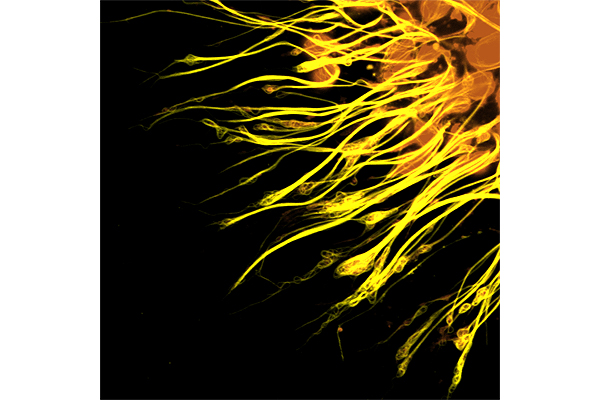Kai Ryssdal: Now that that nasty debt ceiling business has been taken care of, Congress is about this close to its August recess. Lawmakers get a month off starting Friday. And if they’re like regular people, they’ll probably spend part of it reading a good book or two. And that, as it happens, is where we come in.
For our Summer Book Series this year, we’ve asked people from different professional walks of life about writing and work. Books that have shaped their careers or helped them figure out why they do what they do.
Today, biomedical engineer Nina Tandon.
Nina Tandon: For my day job I’m a tissue engineer. I work with cells in the lab and try to direct their growth. Most of my research has centered on the heart, but I’ve also worked with skin and bone. I take a lot of pictures at the microscope, pictures of what the cells are doing. I’ve always been a photographer at heart and I’ve practiced photo since college.
I used to exhibit quite a bit, but now my art is pretty limited to the calendars I make for my brother. My science often remains sequestered in the lab, and my brother, as opinionated as he is, is not exactly an audience.
So when I saw Carl Schoonover’s book Portraits of the Mind, I was blown away. At first glance, it’s a dazzling art book. Imagine a coffee-table collection of captivating, colorful, abstract images. But then take a closer look and see something else.

To view more from the book, click on the image
These stunning images are actually charting scientists’ exploration of the brain throughout history. Shades of grey are revealed electrons transmitting through a single synapse. Or what looks like a roaring fire is actually a time-frequency diagram of brain rhythms.
These images are so beautiful they tickled my brain and then twisted it in knots, because not only are these images the product of the human ingenuity under exploration, but they’re also the clues to unraveling its mysteries.
I hope that airing these images out will allow a broader audience to feel a bit closer to the biology of the brain. After all, the brain is our internal narrator, our personality’s executive producer, so to speak. But the book also encourages a deeper appreciation for the persistent, resourceful scientists who throughout the ages have attempted to illuminate the mysteries of the mind.
They have created art via science.
Ryssdal: Nina Tandon is an electrical and biomedical engineer at Columbia University’s Laboratory for Stem Cells and Tissue Engineering. We’ve got pictures from the book she was talking about — View the slideshow.
There’s a lot happening in the world. Through it all, Marketplace is here for you.
You rely on Marketplace to break down the world’s events and tell you how it affects you in a fact-based, approachable way. We rely on your financial support to keep making that possible.
Your donation today powers the independent journalism that you rely on. For just $5/month, you can help sustain Marketplace so we can keep reporting on the things that matter to you.











